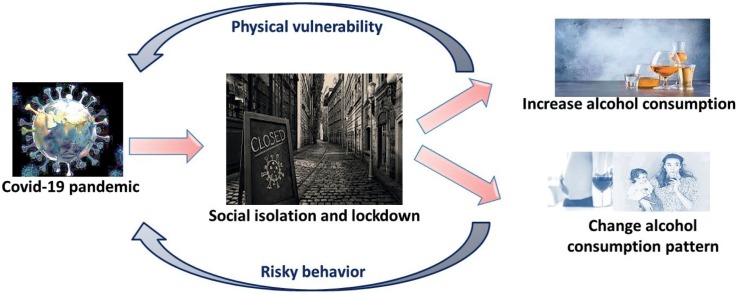- Record: found
- Abstract: found
- Article: not found
COVID-19 pandemic and alcohol consumption: Impacts and interconnections
review-article

Daniela Calina
a
,
*
,
1 ,
Thomas Hartung
b
,
c
,
1 ,
Ileana Mardare
d
,
1 ,
Mihaela Mitroi
e
,
1 ,
Konstantinos Poulas
f ,
Aristidis Tsatsakis
g
,
h ,
Ion Rogoveanu
i ,
Anca Oana Docea
j
,
*
10 March 2021
Read this article at
There is no author summary for this article yet. Authors can add summaries to their articles on ScienceOpen to make them more accessible to a non-specialist audience.
Graphical abstract
Abstract
Alcohol consumption is associated with multiple diseases and might contribute to vulnerability to SARS-CoV-2 infection. It can also catalyze exacerbations of mental and organic illnesses and predispose to behaviors with an increased risk of infection, severity of disease but also independently of sociopathic behavior and violence. Globally, millions of premature deaths from excessive alcohol consumption occur each year. This paper discusses the effects of increased alcohol consumption and the most important consequences on the health of the population during the social isolation and lockdown during current COVID-19 pandemic.
Related collections
Most cited references88
- Record: found
- Abstract: found
- Article: not found
Impact of COVID-19 Pandemic on Mental Health in the General Population: A Systematic Review
Jiaqi Xiong, Orly Lipsitz, Flora Nasri … (2020)

- Record: found
- Abstract: found
- Article: found
Effects of COVID-19 Home Confinement on Eating Behaviour and Physical Activity: Results of the ECLB-COVID19 International Online Survey
Achraf Ammar, Michael Brach, Khaled Trabelsi … (2020)
- Record: found
- Abstract: found
- Article: not found
Psychosocial impact of COVID-19
Souvik Dubey, Payel Biswas, Ritwik Ghosh … (2020)

